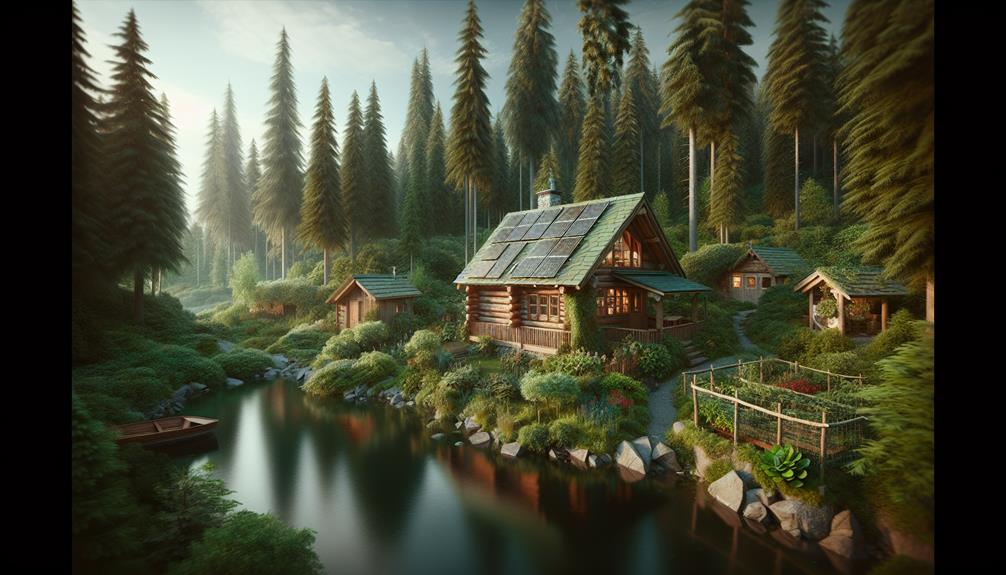So, you’re considering going off the grid?
Picture this: imagine waking up to the sound of chirping birds, breathing in the fresh air, and starting your day without relying on the conventional power grid.
The idea of living off the grid has gained momentum in recent years, as more and more people seek a simpler, more sustainable way of life.
But what exactly does it mean to go off the grid? And what are the advantages and challenges associated with this lifestyle?
Well, hold on tight because we’re about to uncover the fascinating world of off-grid living and all that it entails.
Learn More
Key Takeaways
- Off-grid living has become increasingly popular, with advancements in solar energy technology contributing to its rise.
- Going off the grid offers increased self-sufficiency and allows for greater control over one’s life.
- Off-grid living reduces environmental impact through the use of renewable energy sources and sustainable practices.
- Sustainable food production methods, such as vertical farming and aquaponics, are efficient ways to grow food off the grid.
The Rise of Off-Grid Living
The rise of off-grid living has revolutionized the way you disconnect from traditional utilities and embrace self-sufficiency. With advancements in solar energy technology and a growing desire for independence, more and more people are choosing to live off the grid, even in remote locations. Solar energy is a key component of off-grid living, as it provides a sustainable and renewable source of power. By harnessing the power of the sun, you can generate electricity to meet your daily needs, from powering your home appliances to charging your devices.
Living off the grid in remote locations offers a unique sense of freedom and adventure. Imagine waking up every morning to the breathtaking beauty of nature, surrounded by untouched landscapes and the soothing sounds of wildlife. Remote locations provide an opportunity to disconnect from the chaos of city life and reconnect with the natural world. You can build your own sustainable homestead, grow your own food, and live a simpler, more intentional life.
Off-grid living isn’t without its challenges, but the rewards are worth it. It allows you to become more self-reliant, reduce your carbon footprint, and live in harmony with nature. So, if you’re seeking a sense of belonging and a desire for a more sustainable lifestyle, consider joining the growing community of off-grid enthusiasts and embrace the power of solar energy in remote locations.
Learn More
Advantages of Going Off the Grid
Living off the grid offers numerous advantages that can enhance your lifestyle and promote sustainability. By embracing self-sufficiency, you become less reliant on external sources for your basic needs, giving you a greater sense of independence and control over your life. Going off the grid also reduces your environmental impact, as you rely on renewable energy sources and minimize your consumption of resources.
Here are some specific advantages of going off the grid:
- Increased self-sufficiency:
- Becoming more self-reliant allows you to have greater control over your own life and reduces your dependence on external systems.
- By generating your own power and growing your own food, you can become less reliant on fossil fuels and industrial agriculture.
- Reduced environmental impact:
- By using renewable energy sources like solar panels and wind turbines, you can minimize your carbon footprint and contribute to a cleaner, greener planet.
- Living off the grid often involves practicing sustainable habits such as water conservation and waste reduction, further reducing your environmental impact.
Essential Off-Grid Power Solutions
When it comes to off-grid living, having reliable and efficient power solutions is essential for maintaining a self-sufficient lifestyle. Being off the grid means you are not connected to the traditional power grid, so you need to find alternative energy sources to meet your power needs. Here are some essential off-grid power solutions to consider:
| Power Solution | Description |
|---|---|
| Solar Panels | Solar panels are a popular choice for off-grid power. They harness the sun’s energy and convert it into electricity. They are low maintenance and can provide power even on cloudy days. |
| Wind Turbines | Wind turbines are another great option for off-grid power. They use the wind’s kinetic energy to generate electricity. They work best in areas with consistent wind patterns. |
| Hydroelectric Power | If you have access to running water, you can install a hydroelectric power system. It uses the energy from flowing water to generate electricity. It is a reliable and renewable source of power. |
These power solutions can be combined to create a hybrid system that maximizes your energy production. It is important to assess your power needs and determine the right combination of power solutions for your off-grid lifestyle. With alternative energy sources, you can enjoy a self-sufficient and sustainable way of living.
Learn More
Sustainable Food Production Off the Grid
To continue living self-sufficiently off the grid, it’s essential to explore sustainable food production methods that can support your off-grid lifestyle. When it comes to growing your own food off the grid, two methods that are gaining popularity are vertical farming and aquaponics systems.
These innovative techniques offer unique advantages for those seeking to produce food in a sustainable and efficient manner.
Vertical farming involves growing plants in vertically stacked layers, allowing for maximum space utilization. This method is particularly useful for off-grid living, as it minimizes the need for large plots of land. With vertical farming, you can grow a wide variety of crops, from leafy greens to herbs and even small fruits, all within a compact space. This not only saves precious land but also reduces water usage and the need for pesticides.
Aquaponics systems combine aquaculture (the practice of raising fish) with hydroponics (growing plants in water). In this closed-loop system, the waste produced by the fish provides nutrients for the plants, while the plants naturally filter the water for the fish. This symbiotic relationship allows for a sustainable and efficient food production system. Aquaponics systems require less water compared to traditional farming methods and can produce a higher yield of crops in a smaller space.
Overcoming Challenges in Off-Grid Living
One of the key challenges to overcome in off-grid living is ensuring a reliable and sustainable source of electricity. Being off-grid means you aren’t connected to the traditional power grid, so you need to find alternative ways to generate electricity.
Solar power is a popular choice for off-grid living. Installing solar panels on your property can provide you with a renewable and reliable source of electricity. Another option is to use wind turbines, which harness the power of the wind to generate electricity. It’s important to assess your energy needs and choose the right system for your situation.
In addition to electricity, off-grid living also presents challenges in terms of water sources and waste management. You’ll need to find alternative sources of water, such as rainwater collection or well water. Proper waste management is also crucial to maintain a clean and healthy environment. Composting toilets and greywater systems can help you manage waste effectively.
It’s important to research and plan ahead to overcome these challenges and enjoy a sustainable off-grid lifestyle.
Learn More
Frequently Asked Questions
How Can I Legally Go Off-Grid and Disconnect From Public Utilities?
To legally go off-grid and disconnect from public utilities, you should first research the legal requirements and regulations in your area. Additionally, consider sustainable energy sources like solar panels or wind turbines to power your off-grid lifestyle.
What Are Some Common Misconceptions About Off-Grid Living?
Common misconceptions about off-grid living include thinking it’s easy and cheap. In reality, challenges like limited resources, maintenance, and adapting to a self-sustaining lifestyle can be tough. But with determination and knowledge, you can overcome them and find fulfillment.
How Do Off-Grid Communities Handle Waste Management and Sanitation?
How do off-grid communities handle waste management and sanitation? In these communities, collaboration is key. By working together, sustainable solutions are developed, such as composting toilets and recycling systems, ensuring a clean and healthy environment for all.
Are There Any Government Incentives or Tax Benefits for Choosing Off-Grid Living?
There are government incentives and tax benefits for choosing off-grid living. These financial advantages can help offset the costs of setting up and maintaining an off-grid system. It’s important to research the legal requirements and regulations to fully understand the benefits.
What Are the Potential Health and Safety Risks Associated With Off-Grid Living?
Living off-grid can present potential health risks and safety hazards. It’s important to consider factors like access to medical care, safe drinking water, proper sanitation, and reliable power sources to ensure your well-being and security.
Conclusion
So, if you’re ready to break free from the confines of modern living and embrace a self-sufficient lifestyle, off-grid living is the way to go.
With its numerous advantages, such as independence, environmental sustainability, and cost savings, it’s no wonder that more and more people are choosing to go off the grid.
By utilizing essential off-grid power solutions and sustainable food production methods, you can overcome the challenges and create a fulfilling life off the grid.
Take the leap and experience the freedom and harmony that off-grid living offers.

